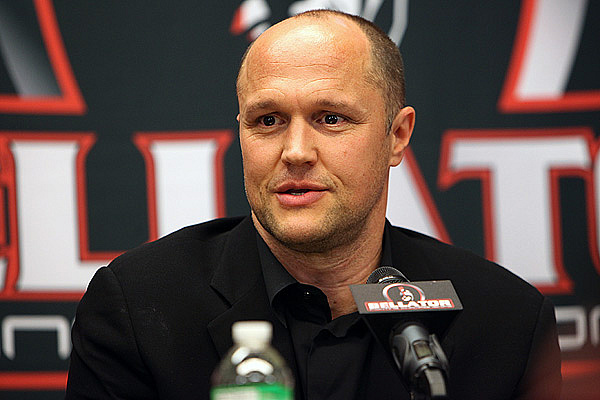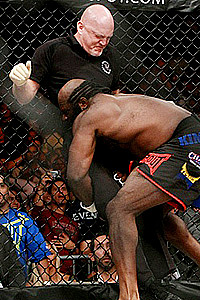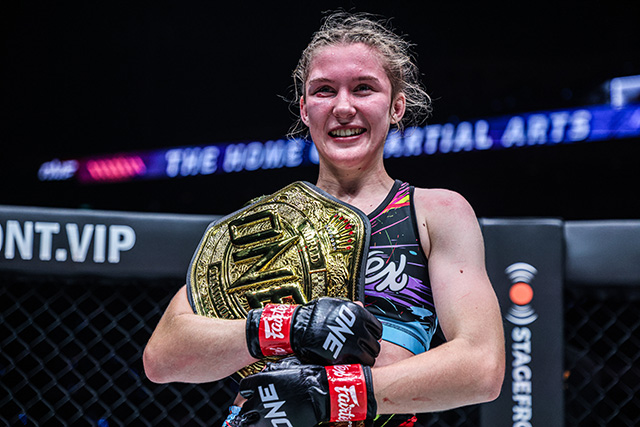One Man’s View: Bellator as Second Fiddle
Bellator as Second Fiddle
Jason Probst Jul 10, 2011

Bellator CEO Bjorn Rebney studied the failures of those who came
before him. | Photo: Dave Mandel
In the fast-changing business side of the mixed martial arts landscape, numerous organizations have emerged as fleeting, big-time players, only to disappear in sudden, often shocking fashion. With an eclectic mix of business models, promotional tactics and unforgettable characters and events shaping their fates, the classification of “second-tier MMA promotion” has often served as the preamble to an ultimately doomed effort.
Some flirt with major television deals before everything goes awry -- think EliteXC. Others are undone by both inevitable and unanticipated forces -- think Affliction. Still others, like the International Fight League, go bankrupt or, like Strikeforce, are acquired by Zuffa LLC, parent company of the Ultimate Fighting Championship.
Advertisement
“Having gone to business school and with a law degree, I know you can’t just jump into this,” said Bjorn Rebney, Bellator’s founder and CEO. “You have to do a lot of empirical digging and really understand the industry -- and brand differently from the 800-pound gorilla that is the UFC.”
Rebney was president and CEO of Sugar Ray Leonard Boxing, which
aired Leonard’s “Friday Night Fights” series on ESPN2 from
2001-04.
If there is a defining ethos for how Bellator has approached establishing itself in the MMA world, it comes from tapping into proven strategies to build a promotion while avoiding the mistakes of its predecessors, many of which brought a fatal mix of hubris to the equation in thinking they would compete with the UFC after a few shows out of the gate.
Thus far for Bellator’s Rebney, the promotion sits right where it is supposed to be: well-entrenched in a recurring network deal on a major channel -- MTV2 -- and populated with good talent, including world-ranked champions Joe Warren, Eddie Alvarez and Hector Lombard. Currently eying its fifth season, the promotion has jumped from ESPN Deportes to Season 2 and Season 3 on the Fox Sports Network, with Telemundo and NBC doing delayed, late night airings. In its current incarnation, the MTV2 deal runs through 2013, with an average of 27 shows per year.
“Seasons two and three weren’t the optimal television deal, but it allowed a lot of people to see Bellator many times each week. It was that next evolution,” Rebney said. “And the tournaments worked well. Guys didn’t get injured, and they moved forward.”

D.
Mandel
Anything can happen in MMA.
Meanwhile, Josh Barnett’s alleged failed drug test began the unraveling that ultimately killed Affliction’s doomed final pay-per-view in August 2009, though that promotion’s demise may have been inevitable given Affliction’s jumping into the deep end of the pool with little brand awareness among fans; its initial pay-per-view numbers were paltry, at best.
Fate tipped the scales in Bellator’s favor when Toby Imada’s inverted triangle over Jorge Masdival, voted “Submission of the Year,” went viral two years ago, providing a huge spike in free advertising for the promotion. The footage, pushed out by Bellator and quickly picked up in the blogosphere and on MMA sites,
gave it a huge stamp of recognition -- something no
MBAs can factor into a business plan.
“We started seeing one or two million views of it. It became a free branding tool. Everything was working in synergy,” Rebney said.
While Bellator’s top-level talent -- Alvarez, Warren and Lombard -- is impressive, the gap between it and potential title contenders remains considerable. However, the belief in the tournament format and its ability to generate interest in potential challengers is what endures, Rebney believes. For example, the much-anticipated Warren-Patricio Freire featherweight title bout -- delayed from July 23 after Freire broke his left thumb -- will still happen this fall. Freire’s Season 4 tournament win guarantees it. In the interim, Warren will still compete in the Season 5 bantamweight draw. There are a lot of moving parts to the equation, but an earned title shot is an earned title shot in Bellator. There are no substitutes.
Another unique part of being the second-tier promotion involves the war for talent. For Bellator, that means holding on to existing big names.
“It’s the nature of a competitive landscape,” Rebney said. “If you sign a multi-year contract to work for somebody and you’re highly talented in what you do, when that contract comes up, you’re gonna have the option to go on the open market and secure a better deal.”
Ironically, the battle over Bellator’s best fighters may play a more significant role in its ultimate success than previous UFC rivals. Few stuck around long enough for that to become a deciding factor, but none had achieved a long-term programming deal like Bellator.
For potential free agents going either way, Bellator’s growth provides a fallback bargaining position for UFC fighters, as well as swoop-in opportunities for the UFC; in the months and years ahead, we will be able to gauge how much of a competitor the UFC thinks Bellator is precisely according to how much effort it puts into luring away its best fighters. Promoters, PR hacks and sound bites often lie, but the numbers never do.
Finish Reading and Reader Comments » Bellator as Second Fiddle: Lessons Learned
Related Articles







